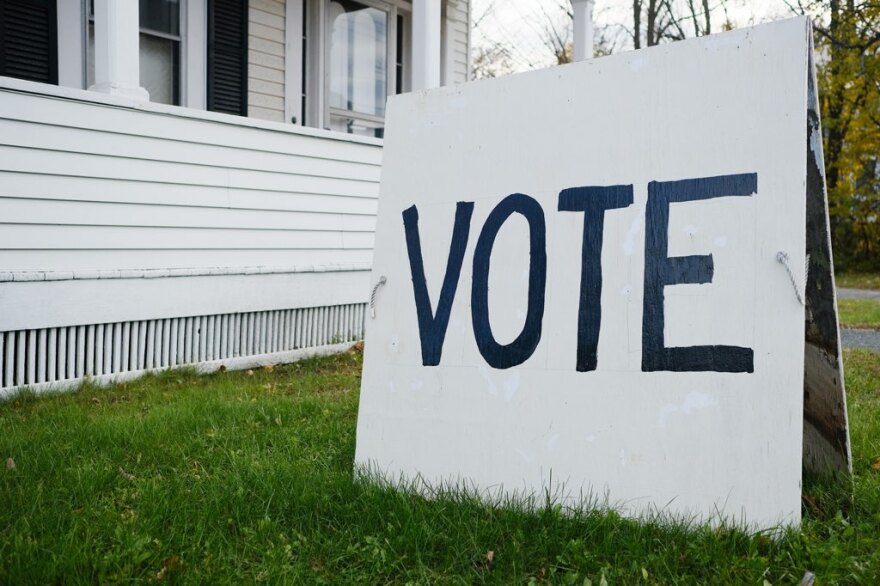The mounting mistrust in New Hampshire elections is not only evidenced in public testimony given at the State House for a slew of bills this session. It’s also been documented by researchers in the state who studied the issue and found that an increasing percentage of Granite Staters have lost trust in government.
That, in turn, is driving legislative proposals that are aimed at ensuring election integrity, through measures like revising requirements for absentee ballots or allowing voters to sue election officials they think have broken a rule. But these bills – several of which were up for a vote in the House during a packed session this week – have raised concerns that it will be more difficult for people to vote, which critics say could weaken the very institution these bills aim to fortify.
“I think what we’re seeing, really from both political parties, is a lack of trust that our public institutions are going to act in ethical and responsible ways,” said Quixada Moore-Vissing, a researcher at the UNH Carsey School of Public Policy.
Moore-Vissing is the author of the 2020 New Hampshire Civic Health Index, which found that Granite Staters’ trust in national government declined by half since 2001. Trust in local government is a bit stronger but still on the decline, dropping from 52 percent to 44 percent in the same time period.
“I do think that there’s just a general culture of distrust in public institutions,” Moore-Vissing said – and that’s of particular concern when it comes to elections, which are a bedrock of democracy. While Moore-Vissing describes Republican concern centering on election integrity and voter fraud, she sees Democrats worry about access and ensuring that low-income people, people of color, or people with disabilities are able to vote.
The index points to several factors that could be driving increased mistrust, like polarization, both locally and nationally; financial and economic stressors; and an influx of newcomers to the state. Public testimony on these issues in the State House highlights another driver: the false idea that widespread voter fraud is impacting election outcomes.
“I believe that the largest problem we have facing our elections today is a pretty dramatic erosion in voter confidence,” Secretary of State David Scanlan told lawmakers in January, while speaking in support of a bill to tighten voter verification measures. Scanlan has repeatedly said New Hampshire elections are sound, and he has complete confidence in the results. But he supported the measure as a way of addressing widespread mistrust in elections.
“We have to address the perceptions and the concerns that voters have, and really the best way is to show them,” he said.
He advocates for creating as much transparency in the process as possible, training for local election officials to limit human errors, and educating voters to address misinformation that can spawn mistrust.
The House, on Wednesday, opted for a more punitive approach – passing House Bill 1567, which instructs the Attorney General’s Office to fine municipalities if their election officials break the rules. Republicans say this will incentivize municipalities to correct any issues that arise. Election officials who knowingly fail to perform their duties would be guilty of a misdemeanor. Republicans point to the Windham election audit, and say that while there was no finding of criminal intent “there was likely a knowing failure to perform.”
Several election law bills taken up by the House on Wednesday tried to tackle residency requirements, after Senate Bill 3 was found unconstitutional in 2021. House Bill 1203, which aims to maintain strong residency and domicile requirements, passed 185-163. It keeps parts of SB 3 intact, like requiring the supervisor of the checklist to verify people who use a voter affidavit. Democrats criticized what they called a two-tiered registration system – with different requirements depending on whether you register within 30 days of an election or before that.
The House also passed a bill requiring the date a person registers to vote be provided in the checklist along with other voter information, a provision Republicans said would increase trust in elections and make the process more transparent. Democrats said it was unnecessary and would be costly and laborious for towns to scour old records predating the statewide voter registration database launched in 2006. House Bill 1009 passed, 185-167.
Other bills targeted campaign finance reform. The House narrowly passed House Bill 1082, 177-176, with the House speaker voting to break the tie. The measure prevents anyone running for secretary of state or state treasurer from forming a political action committee, or PAC, which would limit their ability to fundraise if it becomes law.
These bills will now advance to the Senate.
Bills that failed
The House took up several bills on Wednesday that looked at updating or adding residency requirements for voting.
A constitutional amendment requires a vote of three-fifths of the House’s current membership, or 234 votes, to pass the House, a margin that CACR 15 failed to receive. The proposal, which received only 190 votes in favor, 165 in opposition, would have put a requirement into the constitution that only citizens of the state can vote in New Hampshire.
CACR 19 would have added language to the constitution requiring paper ballots, which are currently used. It too failed to gain enough votes to move forward, 195-160.
An effort to create ranked-choice voting, House Bill 1264, also failed.
And an attempt to make voting information available in languages other than English – House Bill 1442 – was unsuccessful.
New Hampshire Bulletin is part of States Newsroom, a network of news bureaus supported by grants and a coalition of donors as a 501c(3) public charity. New Hampshire Bulletin maintains editorial independence. Contact Editor Dana Wormald for questions: info@newhampshirebulletin.com. Follow New Hampshire Bulletin on Facebook and Twitter.







